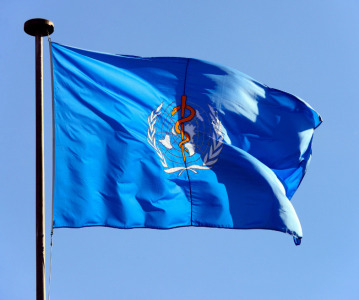Boehringer Ingelheim's third generation EGFR TKI, BI 1482694, receives FDA Breakthrough Therapy Designation for treatment of patients with NSCLC

FDA designation reinforces potential for BI 1482694 to become a new treatment option for patients with EGFR mutation-positive lung cancer with a T790M mutation.
Boehringer Ingelheim has announced that FDA has granted Breakthrough Therapy Designation to its investigational third-generation epidermal growth factor receptor (EGFR) mutant-specific tyrosine kinase inhibitor (TKI), BI 1482694 (HM61713). The designation is based on results from the Phase I/II HM-EMSI-101 clinical trial evaluating the treatment of T790M mutation-positive NSCLC in patients whose tumors have stopped responding to currently available EGFR-directed therapies.
"Boehringer Ingelheim is pleased that the FDA has granted Breakthrough Therapy Designation to our investigational third-generation EGFR inhibitor BI 1482694. We feel this designation reflects the potential of the compound to be an important part of the treatment of non-small cell lung cancer in patients with T790M mutation," said Tarek Sahmoud, vice president, Oncology Clinical Development and Medical Affairs. "The continued development of BI 1482694 and our entire oncology portfolio underscores our commitment to advancing novel treatment approaches designed to help improve the lives of people with cancer."
BI 1482694 is a novel, third-generation, oral EGFR mutant-selective TKI developed to specifically target tumours with T790M mutations. The T790M mutation is known as the most common resistance mechanism to develop in response to treatment with EGFR TKIs. It is found in approximately 50–60% of patients who have previously received EGFR TKI therapy.
Results from HM-EMSI-101, a Phase I/II clinical trial of BI 1482694, provide additional evidence of the strong efficacy signals and favorable safety profile of BI 1482694 at the recommended Phase II dose of 800 mg once daily. These data were recently presented at the ESMO Asia 2015 Congress in Singapore and ASCO 2015 in Chicago.
The most common treatment-related adverse events (AEs) included (total/grade 3) diarrhea (55%/0%), nausea (37%/0%), rash (38%/5%) and skin itching: 36%/1%).
The Global Phase II trial, ELUXA 1, has been initiated to evaluate the efficacy and safety of BI 1482694 in patients with T790M mutation-positive NSCLC whose tumors stopped responding to currently available EGFR directed therapies. The primary endpoint of this trial, which is the first in a broad clinical development program for BI 1482694, is objective response rate.
Boehringer Ingelheim has an exclusive license and collaboration agreement with Hanmi Pharmaceutical Co. Ltd for the development and global commercialization rights of BI 1482694 (HM61713), except in South Korea, China and Hong Kong.
Related News
-
News Pharmaceutical industry supports COP28 health stance in joint statement
As COP28 takes place over this week in Dubai, UAE, several bodies in the pharmaceutical and health industries have come together to announce support of key movements in sustainability in the sector, and to recognise sustainability as a health issue.&nb... -
News Biden backs Cold-War measures to shore-up medical supply chains
In a recent strategy to combat rising inflation and the cost of living crisis, President Joe Biden has invoked a Cold War-era act to increase investment in a selection of medicines and supplies. -
News CPHI Podcast Series: What does the changing US Pharma market mean for industry and patients alike?
In this week's episode of the CPHI Podcast Series Lucy Chard, Digital Editor for CPHI Online is joined by James Manser to discuss the political and market changes in the US pharma field. -
News Which 10 drugs are open to price negotiation with Medicare in the USA?
The Centres for Medicare & Medicaid Services, under the Biden administration in the USA, has released a list of the 10 drugs that will be open to price negotiations as part of the new legislation under the Inflation Reduction Act (IRA). -
News 10 Major Drug Approvals So Far in 2023
Last year, 37 novel drugs were approved by the FDA, this was a high number for such a category, and covered many fields including oncology, demonstrating how promising further research is, and how it is only continuing to build. To date, there are alre... -
News Novartis agrees for copies to be made of cancer drug to reach poorer countries
Novartis signs agreement with MPP to have generics of it's leukemia drug made so that it can be more easily distributed to the world's poorer countries. -
News CPHI Podcast Series: outsourcing and manufacturing trends
Listen to the CPHI Podcast Series this June to hear Gil Roth of the PBOA speak with Digital Editor Lucy Chard about the biggest trends and topics to watch in pharma outsourcing and manufacturing at the minute. -
News New WHO health emergency guidelines expect full transparency from Big Pharma
The WHO are proposing a new set of pandemic guidelines to set out how future global health crises should be handled.
Position your company at the heart of the global Pharma industry with a CPHI Online membership
-
Your products and solutions visible to thousands of visitors within the largest Pharma marketplace
-
Generate high-quality, engaged leads for your business, all year round
-
Promote your business as the industry’s thought-leader by hosting your reports, brochures and videos within your profile
-
Your company’s profile boosted at all participating CPHI events
-
An easy-to-use platform with a detailed dashboard showing your leads and performance







